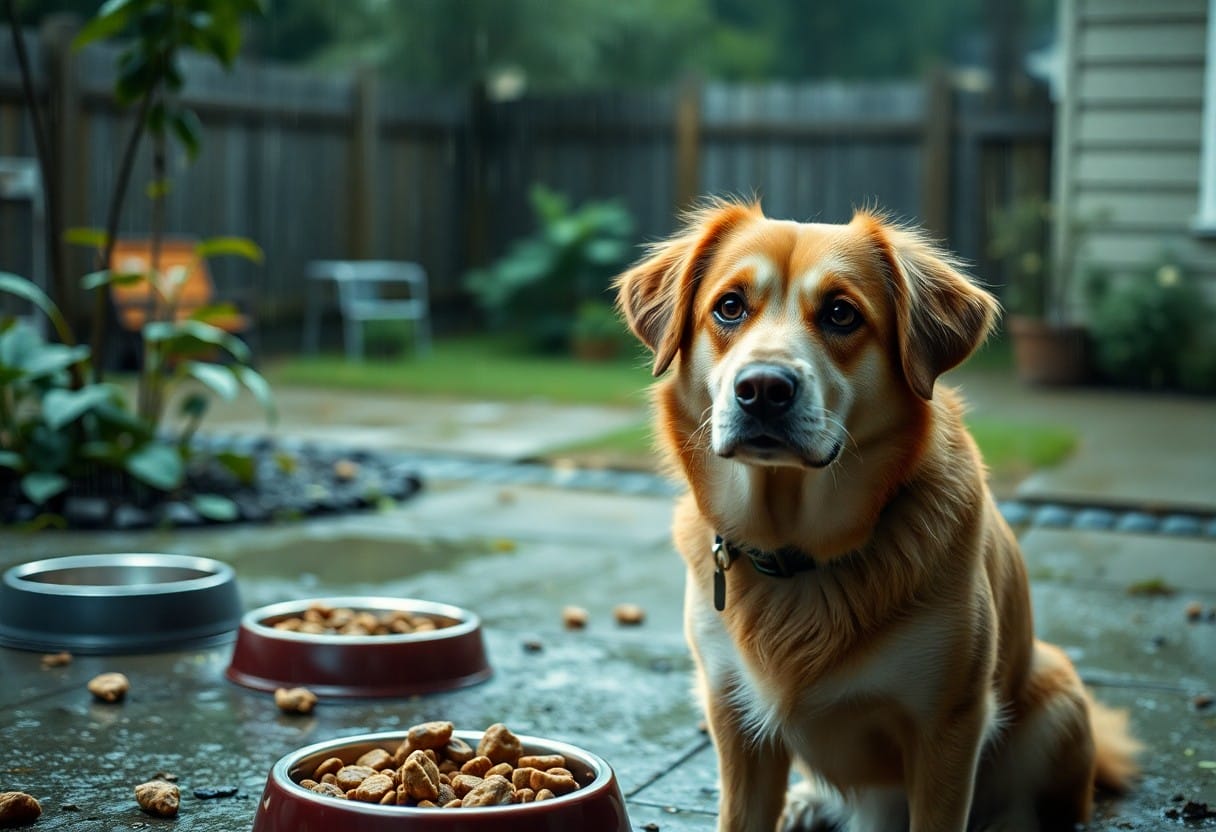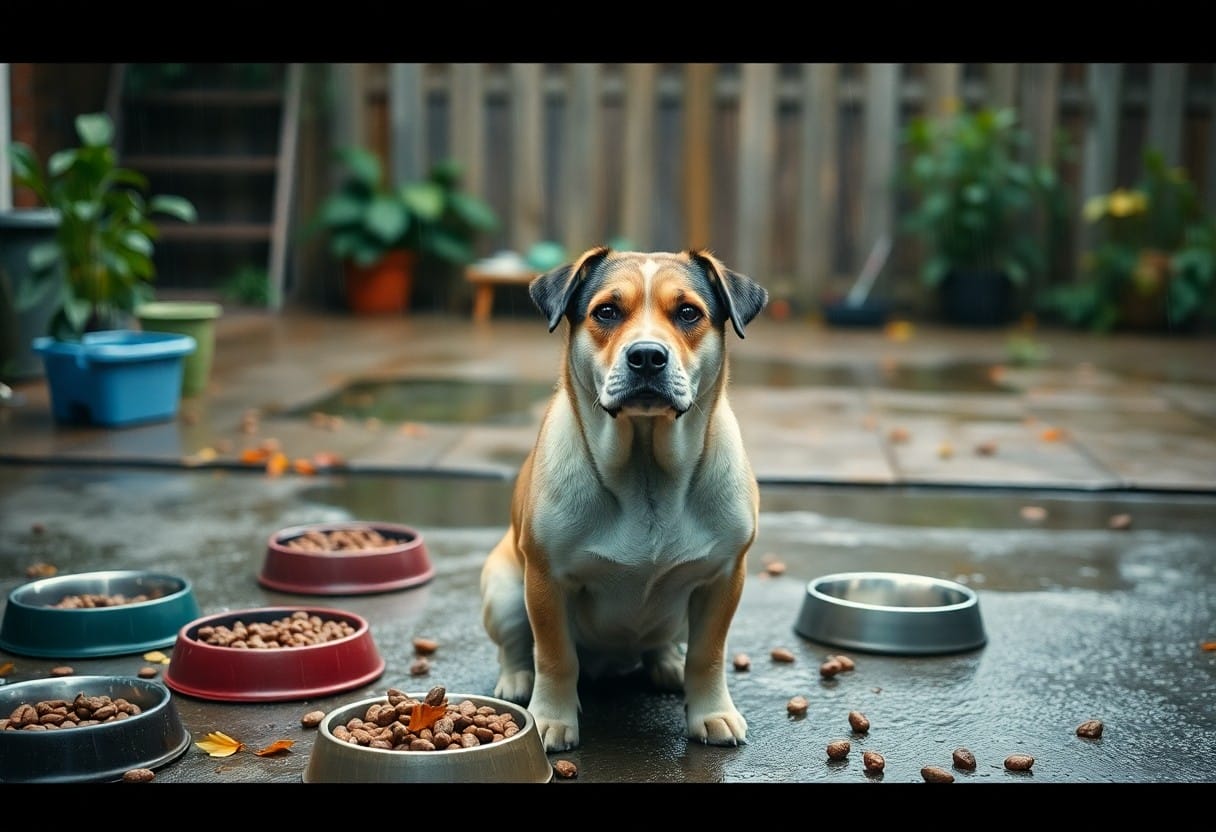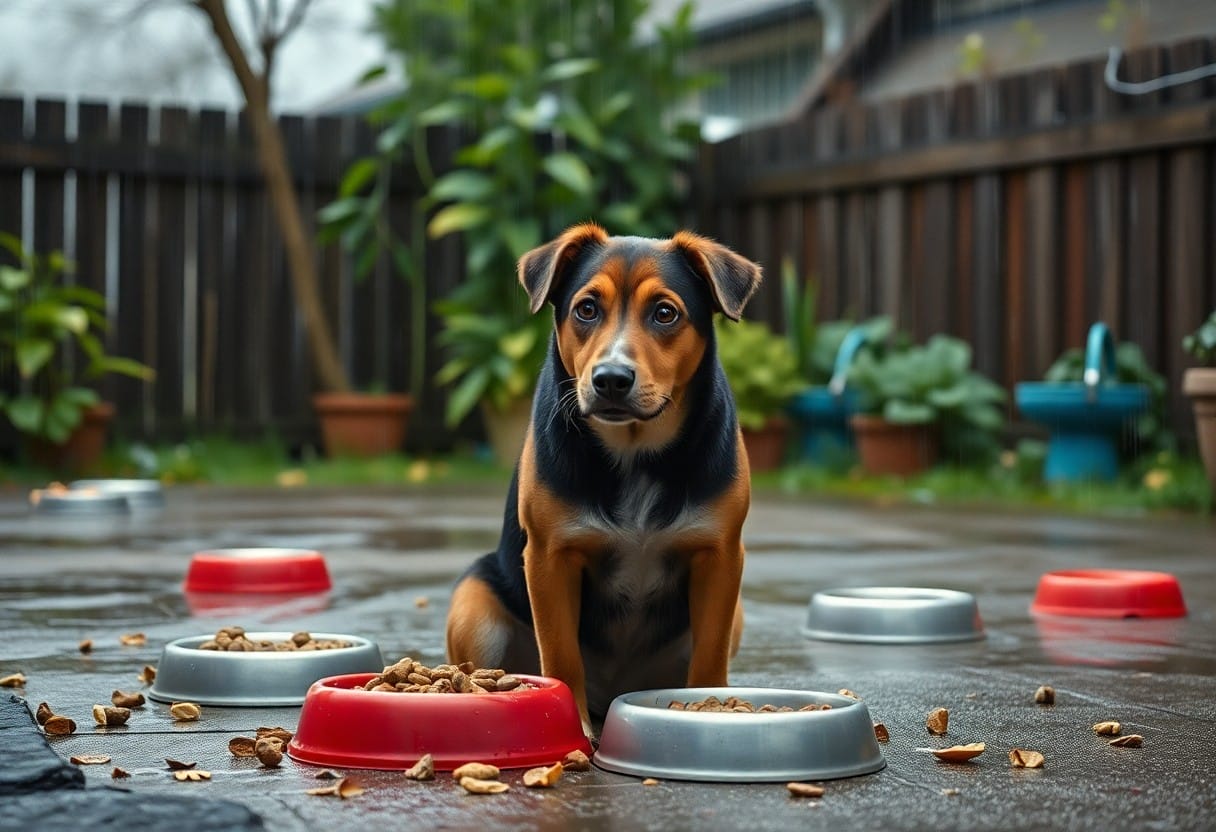
Monsoon Woes - Preventing Digestive Issues in Dogs
Share
There's no doubt that the rainy season brings joy to many, but for your dog, it can lead to serious digestive issues. The increased humidity and wet conditions create an environment conducive to bacterial growth and may lead to infections or upset stomachs. To ensure your furry friend stays healthy, it's vital to take preventive measures such as monitoring their diet, keeping them dry, and practicing good hygiene. This guide will provide you with valuable tips on how to protect your pet during this unpredictable season.

Key Takeaways:
- Hydration: Ensure your dog has access to fresh water at all times to prevent dehydration during the humid monsoon season.
- Dietary Adjustments: Consider modifying your dog's diet to include easily digestible foods that can help mitigate digestive upsets.
- Prevent Parasites: Keep up with veterinary check-ups and treatments to protect against parasites that thrive in wet conditions and may lead to gastrointestinal issues.
Understanding the Monsoon Season and Its Impact on Dogs
Before the onset of the monsoon season, you may notice various changes in your environment and your dog's behavior. The shifting weather patterns can contribute significantly to your dog's health, particularly their digestive health. As rain begins to fall and temperatures drop, the sudden transition can disrupt the normal routine of your pet. Changes in diet, activity levels, and even stress due to thunder or lightning can complicate their overall well-being during this time.
Changes in Weather Patterns
Beside the changes in temperature, you should be aware that the frequency of storms and heavy rainfall can also affect air pressure and humidity levels. These fluctuations can lead to anxiety in some dogs, causing them to lose their appetite or become less active. It is vital to monitor your dog's mood and dietary habits closely during this transition, as changes in behavior can signal underlying digestive issues.
Increased Humidity and Its Effects
An increase in humidity during the monsoon season can create a breeding ground for various bacteria and parasites that may harm your dog's digestive system. High moisture levels can also lead to mold growth in your home, contributing to gastrointestinal upset. As such, your dog's chances of experiencing issues like diarrhea and vomiting increase significantly in humid conditions.
Further, you should be cautious of potential *intestinal parasites*, which thrive in warm, damp conditions. These can lead to serious issues, including *malnutrition*, if not treated promptly. The increased humidity can also exacerbate pre-existing conditions in your dog, making it more challenging for them to maintain their standard digestive function. Keeping your dog's living environment clean, dry, and free from potential hazards is vital to reducing the risks associated with *high humidity* during the monsoon season.
Common Digestive Issues in Dogs During Monsoon
There's no denying that the monsoon season brings along a few challenges for you and your dog. With increased humidity and damp conditions, your furry friend might experience various digestive issues that can affect their overall health and happiness. In this season, it's imperative to stay informed about potential problems, such as gastroenteritis and diarrhea, so you can take proactive steps.
Gastroenteritis
Digestive upset is often seen during the monsoon, with gastroenteritis being one of the main concerns for dogs. This condition is characterized by inflammation of your dog's stomach and intestines, leading to symptoms such as vomiting, diarrhea, and abdominal pain. The increased presence of mold, bacteria, and parasites in wet environments can contribute to the development of gastroenteritis. If you notice any of these signs in your dog, seeking veterinary care promptly is advisable to address the underlying cause.
Diarrhea
Beside gastroenteritis, diarrhea is another common issue during the monsoon. This condition can result from various factors, including dietary changes, exposure to contaminated water or food, and stress caused by changes in weather. You might find that the increased humidity and alteration in your dog's routine during this time can lead to soft stools or excessive bowel movements. It's important to monitor your dog's condition closely, as prolonged diarrhea can lead to dehydration and other complications.
Monsoon season can exacerbate diarrhea in your dog, making it imperative to keep a close eye on their hydration levels.
Ensure your dog has access to fresh, clean water at all times to help counteract potential dehydration. If diarrhea persists for more than a day or is accompanied by other concerning symptoms, consult your veterinarian or reach out to DrPashu for instant expert advice and guidance on the best course of action.
Prevention Strategies for Digestive Issues
To combat the potential digestive issues your dog may face during the monsoon season, it's crucial to implement effective prevention strategies. By addressing dietary habits, ensuring proper hydration, and taking extra precautions with their environment, you can protect your furry friend from discomfort and health risks. Understanding the unique needs of your dog during this season will equip you to make informed choices that support their well-being and vitality.
Diet Adjustments
Adjustments to your dog's diet can significantly impact their digestive health, especially during periods of increased humidity and change in weather. Consider switching to a diet that contains high-quality ingredients, less filler, and is specifically formulated to support digestion. Options that include probiotics and prebiotics can help maintain a healthy gut flora, reducing the chances of gas and bloating. Additionally, introducing gradual changes—such as mixing in wet or moisture-rich foods—can help your dog adapt to any dietary changes more smoothly.
Hydration and Water Quality
Beside diet, ensuring your dog has access to clean and fresh water at all times is imperative. The monsoon can lead to contaminated water sources, which can contribute to digestive distress. Always provide your dog with filtered or bottled water rather than relying on outside sources. Regularly clean their water bowl to prevent any bacterial growth, and consider adding a water add-in supplement to promote digestion and hydration.
Further enhancing your dog's hydration can be achieved by incorporating water-rich fruits and vegetables into their diet, such as cucumber or watermelon, which are safe for dogs and can help keep them hydrated. During the rainy season, it's vital to be proactive in managing water quality, as stagnant water can harbor harmful pathogens that may lead to gastrointestinal issues. By focusing on high-quality hydration and a safe diet, you effectively safeguard your dog from potential health problems associated with the monsoon season.

Tips for Maintaining a Clean Environment
Despite the joy that the monsoon brings, it can also lead to various digestive issues in dogs if you don't maintain a clean environment. Keeping your surroundings tidy is imperative for the health of your furry friend. Here are some effective tips to follow:
- Regularly clean your dog's bedding and toys.
- Emphasize cleaning up after your dog during walks.
- Utilize pet-safe disinfectants for surfaces.
- Keep food and water bowls clean and free from debris.
- Ensure good ventilation in your home to minimize humidity.
After incorporating these practices into your routine, you will significantly reduce the chances of your dog developing any intestinal disturbances related to a dirty environment.
Reducing Bacterial Growth
Among the many concerns during the monsoon, bacterial growth stands out as a major risk factor affecting your dog's health. Wet and humid conditions can create an ideal breeding ground for bacteria, especially in areas where your dog frequents. To combat this, ensure that the places where your dog plays and sleeps are thoroughly cleaned and dried. Regular use of dehumidifiers can also help in keeping the environment dry and less prone to bacterial proliferation.
Moreover, providing a well-balanced diet can boost your dog's immune system, making it more resilient against any harmful bacteria present in its environment. This proactive measure can help in preventing potential digestive issues, thus ensuring your beloved companion remains healthy during the monsoon.
Springtime Feeding: Adjusting Your Dog’s Diet Post-Winter
As the seasons change, so should your dog’s diet. Discover how to adjust their nutrition for a healthier, more active spring.
Proper Waste Management
Waste management is a key factor in maintaining a clean environment for your dog during the monsoon season. Keeping your surroundings clean not only helps in hygiene but also reduces the risk of attracting pests, which can carry harmful diseases that affect your dog's digestive system. Proper disposal of your dog's waste is imperative—always use biodegradable bags for easy cleaning.
Tips for effective waste management include consistently taking your dog to designated potty areas, and promptly disposing of waste to prevent any lingering odors or pest attraction. Additionally, consider creating a designated waste disposal area in your yard with a secure container to minimize exposure to bacteria. Keeping this area well-maintained will not only help your dog stay healthy but will also promote a more pleasant living environment for you both.
Recognizing Signs of Digestive Distress
After the arrival of the monsoon season, it's important for you to stay vigilant regarding your dog's health. The humidity and wet conditions can trigger various digestive issues that may not be immediately apparent. By staying informed about the signs of digestive distress, you can give your furry friend the relief they need.
Symptoms to Watch For
Across this season, you should be on the lookout for several indicators that may suggest your dog is experiencing digestive discomfort. Symptoms such as vomiting, diarrhea, or a decrease in appetite are common signs of digestive issues. Gas or bloating can also be concerning, as they may indicate distress. Additionally, if your dog seems lethargic or exhibits unusual behaviors, these could signal underlying problems that need your attention.
When to Seek Veterinary Care
Below are guidelines to help you determine when it's time to take your dog to the vet. If your dog exhibits any of the aforementioned symptoms lasting more than 24 hours, you should not hesitate to consult a veterinary professional. Persistent vomiting or diarrhea, especially if accompanied by blood, can lead to severe dehydration, which is particularly dangerous in dogs. If your pet shows signs of significant pain, struggles to have bowel movements, or is unusually timid, seeking immediate care is advised.
Meal-Time Manners: Teaching Your Dog How to Wait for Food
Good manners start at the dinner bowl! Learn how to teach your dog to patiently wait for their meals with these simple and effective tips.
Due to the potential serious consequences of digestive issues, acting swiftly can make a significant difference in your dog's health. Ignoring symptoms can lead to more complicated health problems and prolonged discomfort for your pet. Staying alert to changes in behavior and health can greatly support your dog's well-being during the monsoon season.

The Role of Probiotics and Supplements
Many dog owners often overlook the importance of probiotics and supplements in maintaining their pet's digestive health, especially during the challenging monsoon season. These beneficial microorganisms play a vital role in enhancing your dog's gut flora, helping to balance out the natural bacteria in their digestive system. By introducing quality probiotics into your dog's diet, you can significantly improve their ability to weather gastrointestinal disturbances caused by damp, humid weather, such as diarrhea or bloating. Additionally, the flexibility of probiotics means they can be easily incorporated into your dog's daily diet, making it effortless for you to promote a healthy gut.
Benefits for Canine Digestive Health
After including probiotics in your dog's routine, you may notice a remarkable difference in their overall digestive health. Probiotics contribute to improved nutrient absorption, which can enhance your dog's energy levels and overall health. Moreover, they help combat harmful bacteria, reducing the risk of infections that can lead to more serious digestive issues. For pet owners dealing with anxious dogs or those with sensitive stomachs, probiotics offer a natural solution to minimize digestive stress, thus promoting greater comfort and health.
Recommended Products
Probiotics come in many forms such as powders, chews, or capsules, allowing you to choose what works best for your dog. If you're considering introducing these supplements, look for products that contain a variety of strains tailored to canine health, such as Lactobacillus acidophilus and Bifidobacterium bifidum. Always opt for reputable brands that have undergone third-party testing to ensure their safety and efficacy.
Due to the wide range of probiotic products available for dogs, it's imperative to conduct thorough research before making a selection. Seek out those that have clear labeling detailing the specific strains included and their CFU (colony-forming units) count, as a higher CFU can indicate a more potent product. Additionally, consult your veterinarian for personalized recommendations that align with your dog's specific health needs, especially if they have pre-existing conditions or if you are introducing these products for the first time.
Final Words
Hence, keeping your dog healthy during the monsoon season requires attentiveness to their diet and overall wellness. You must be proactive in preventing digestive issues by adjusting your dog's eating habits, ensuring their food is fresh and clean, and paying close attention to their hydration levels. It's imperative to avoid feeding them anything that might be contaminated, and always monitor them for any changes in behavior or health during the rainy season.
Additionally, consider providing your dog with a routine that promotes their comfort and digestion, including regular exercise, mental stimulation, and a consistent eating schedule. Being proactive and attentive to your dog's needs during the monsoon can significantly reduce the risk of gastrointestinal disturbances. By taking these steps, you not only protect their health but also enhance their overall quality of life during the wet season.
FAQ
Q: How can monsoon season affect my dog's digestive health?
A: During the monsoon season, humidity increases, creating a breeding ground for bacteria and parasites. This can lead to gastrointestinal issues in dogs, such as diarrhea and vomiting. Additionally, dogs may ingest contaminated water or food, causing further digestive disturbances. Keeping your dog's environment clean and monitoring their food and water sources is necessary during this time.
Q: What signs should I look for if my dog has digestive issues during the monsoon?
A: Common signs of digestive issues in dogs include vomiting, diarrhea, lack of appetite, lethargy, and abdominal discomfort. If your dog shows persistent symptoms or appears to be in pain, it is important to consult your veterinarian for guidance and potential treatment.
Q: Are there specific dietary recommendations for dogs during the monsoon season?
A: Providing a balanced diet is important year-round, but during the monsoon, feeding your dog easily digestible foods can help prevent digestive issues. Options such as boiled chicken and rice or specialized dog food formulated for sensitive stomachs can be beneficial. Additionally, ensure that your dog's food is stored properly and is free from contamination.
Q: How can I ensure my dog stays hydrated during the rainy season?
A: Keeping your dog hydrated is vital, especially during the monsoon when they may be less active. Provide fresh, clean water at all times and avoid letting your dog drink from puddles or standing water, as these can contain harmful bacteria. You can also incorporate watery foods, like broths or wet dog food, to help maintain hydration levels.
Q: What preventive measures can I take to protect my dog from digestive issues during this season?
A: To minimize the risk of digestive issues during the monsoon, avoid giving your dog scraps or questionable food sources, keep their living area clean, and regularly check for any signs of parasites or illness. Additionally, maintaining a consistent feeding routine can help regulate their digestive system. Regular vet check-ups can also ensure your dog remains healthy during seasonal changes.
